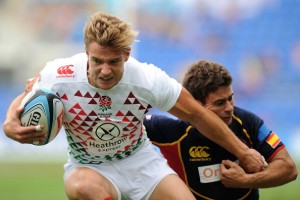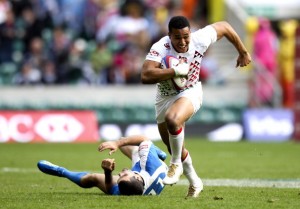
Powerhouse: Mike Ellery has recovered from injury for the Las Vegas Sevens, but can he help England take the title?
By Bea Asprey, Rugby World Staff Writer
SIMON AMOR is three tournaments in to his tenure as England Sevens head coach, and he has already started to make some changes to the squad. We caught up with the former IRB Sevens Player of the Year to find out a bit more about the team, and what plans he has for England.
RW: What are England’s strengths, and how would you like them to improve?
SA: Traditionally England have great pace, and they’re very good in broken field. I’d like them to improve defence and become more direct, physically, in the contact. I’d like them to be more confrontational.
Sevens is about doing the basics at world-class level, so I also want everyone to improve on that. It sounds very simple, but there’s a lot in the quality of a catch, pass or tackle.
RW: Have you changed the way you train to mirror that?
SA: We do more contact work now. These guys aren’t playing 15s, so they’re not doing contact week in, week out. The breakdown is so important, as is their tackle technique.
There’s always a risk of injury when you do contact work in training and they do pick up bumps and bruises, but rugby is a contact sport, and of course you try to limit that. There’s also an element that the boys can become more body-hardened by doing the contact work and in addition, we have a brilliant medical team working hard to keep the boys fit.
RW: Which team is setting the benchmark on the circuit?
SA: New Zealand. As a team they’ve never had out and out pace, but they are good physically and their ability to read the game, to feel it, is outsanding. They also have a lot of good decision-makers.
There’s no culture of sevens in the UK, so it takes time for guys to get the feel of how to create space, and manipulate it. We try to teach it by doing a lot of repetitions, in mini games in training.
RW: Which England players should we look out for in Las Vegas?
SA: Mike Ellery had a great tournament in Dubai. Unfortunately he was injured and missed the following week’s tournament in South Africa, so it’s great to have him back. And Marcus Watson was also in great form in our last outings.
Mitch (Tom Mitchell) is becoming a great playmaker and leader in our squad. I’ve shared the captaincy around a bit, and Tom Powell did a great job for us at the last few tournaments, but Mitch could potentially stay in the role for a while. At the moment I’m naming a squad tournament by tournament, because I want the guys to feel that pressure to perform every time they step on the pitch. But the long-term goal is to have a steady, settled captain.
RW: Why did you leave Mat Turner and John Brake out of the squad this time?
SA: Mat did well in South Africa, and he’s working on a number of areas of his game along with everybody else. But he’s been in South Africa for a few weeks sorting out his girlfriend’s visa, and because he’s not been training I’ve chosen to reward the other guys in the squad.
John Brake has an excellent attitude, but others have just edged him in training. In addition, I felt like Crackers deserved his opportunity, a hugely experienced player who will be valuable in Las Vegas.
RW: What changes would you like to make to England’s sevens programme?
SA: Every nation is stepping up and our programme has been evolving for the last three months. I’d like the guys to be here and training together full time (Monday to Friday instead of three days per week). The more time spent together, the more their understanding and communication with each other will improve.
RW: Should sevens be used as a development tool for 15s, or should it stand alone?
SA: I don’t believe sevens should stand alone. We’ve got some talented players in our squad who may well go on to play 15s one day, and although there will always be some specialist sevens players, I don’t think they should be pigeonholed. Using sevens to develop players is a proven model used around the world. It depends slightly on the position, but as a rule sevens players are excellent in broken field and phase play attack, and good decision makers.
RW: Tell us about your new backroom staff.
SA: We’re ambitious, and we want to give our players the world’s best support with the best people in that team. Dan Howells has just joined us from Wasps, to head up our strength and conditioning, and Damian McGrath has joined me as the assistant coach. Scott Drawer, who’s just joined the RFU, will also be helping us from time to time.
We want to link our strength and conditioning with the rugby in training a bit more. If we do our rugby training under fatigue, it’ll develop the boys’ decision making and also intensify the session – just like the situation you’d get at a tournament.







